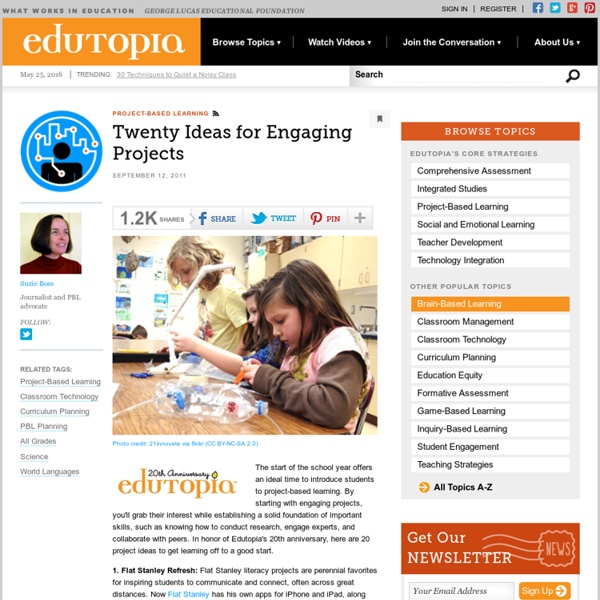



http://www.edutopia.org/blog/20-ideas-for-engaging-projects-suzie-boss
Project Based Learning By Wayne D'Orio Here’s a riddle: Imagine there is a learning technique proven effective through 100 years of use that is now enhanced by the power of today’s technology. Imagine it can excite learners to continue their work well past the parameters of the school day. Summer Planning for Successful PBL Photo credit: iStockPhoto It is often said that leading and teaching in project-based learning schools are like building an airplane while flying it. During the summer, we land the plane and we have a chance to just build. In the spirit of summer, this post is brief and concrete so we have more time for the beach and planning! Here are three ways you can plan for student success this summer: 1.
Project Based Learning (image from education-world.com) Project Based Learning (PBL) is a great way to teach students content, 21st century skills, and engage them in something fun and educational. I spoke more about PBL in an earlier blog ( and we had some great reader comments (Tech&Learning, May 2009, page 14). Today I'd like to give some tips and ideas on how to get started with PBL in your classroom. First of all, PBL can be used in any classroom, in any subject, at any grade level.
62 School Project Ideas Are you a teacher, parent, or student looking for a creative project idea? You should find this list of 62 project ideas to be a great resource for designing activities and projects. When students create projects, they are the active agent in the learning process; the classroom is centered on the student rather than the teacher and the role of the instructor evolves to that of the facilitator. What is TPACK? Abstract This paper describes a framework for teacher knowledge for technology integration called technological pedagogical content knowledge (originally TPCK, now known as TPACK, or technology, pedagogy, and content knowledge). This framework builds on Lee Shulman’s construct of pedagogical content knowledge (PCK) to include technology knowledge. The development of TPACK by teachers is critical to effective teaching with technology. The paper begins with a brief introduction to the complex, ill-structured nature of teaching.
What Teachers Need to Know about Authentic Learning Authentic learning is learning in the "real world". It focuses on authentic deeds and students get to solve complex problems and find their solutions using a variety of activities like: role-playing, case studies, and collaborative peer learning. Authentic learning is idiosyncratic in its nature in that the setting where it takes place is multidisciplinary. In other words, the learning environment can be accommodated to foster different learning events. Now with the widespread of web technologies, more and more environments for authentic learning have been created. Think of the virtual learning communities or what James Paul Gee called affinity spaces.
Innovative Projects & Lessons These technology integration projects and activities engender student creativity & empowerment. For more examples, visit our partner sites: Best of History Web Sites , The Center for Teaching History with Technology , and Teaching English with Technology . ETT Indicates a project from the EdTechTeacher Team. Books for Babies Creator: Suzy Brooks ( @simplysuzy ) Suggested Grade Level: Elementary Subject Area: English/Language Arts & Service Learning Common Core Georgia Performance Standards Georgia has joined 44 other states, the District of Columbia (D.C.), and 2 territories, along with the Department of Defense Education Activity, in formally adopting a set of core standards for kindergarten through high school in English language arts, mathematics, and grades 6-12 literacy in science, history/social studies, and technical subjects. The CCGPS provide a consistent framework to prepare students for success in college and/or the 21st century workplace. These standards represent a common sense next step from the Georgia Performance Standards (GPS). What do CCGPS mean for Georgia? The CCGPS for English Language Arts, mathematics, and literacy in science, history/social studies, and technical subjects will ensure that all Georgia students have an equal access and opportunity to master the skills and knowledge needed for success beyond high school. CCGPS Online Professional Development
Common Core Big Idea Series 1: A New Blueprint Editor's note: This is the first post in a five-part series which takes a look at five big ideas for implementation of the Common Core State Standards, authored by Jay McTighe and Grant Wiggins In our travels around the country since the Common Core Standards were released, we sometimes hear comments such as, “Oh, here we go again;” “Same old wine in a new bottle;” or “We already do all of this.” Such reactions are not surprising given the fact that we have been here before. Projects at High Tech High Project Based Learning at HTH High Tech High: buy the book These projects are examples of the work that is done at all of the High Tech High Schools. Pourquoi Stories: Creating Tales to Tell Why ReadWriteThink couldn't publish all of this great content without literacy experts to write and review for us. If you've got lessons plans, activities, or other ideas you'd like to contribute, we'd love to hear from you. More Find the latest in professional publications, learn new techniques and strategies, and find out how you can connect with other literacy professionals. More
Document Analysis Worksheets Español Document analysis is the first step in working with primary sources. Teach your students to think through primary source documents for contextual understanding and to extract information to make informed judgments. Use these worksheets — for photos, written documents, artifacts, posters, maps, cartoons, videos, and sound recordings — to teach your students the process of document analysis. Nets Standards Education technology standards to transform learning and teaching The time for major change in education is now. In a world where rapid advances in technology have a profound impact on the ways we work, communicate and live, education has struggled to keep pace.